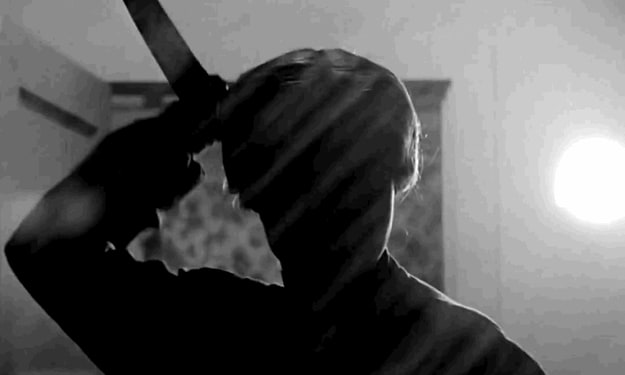Why Are We So Fascinated With Serial Killers?
We look like them, think we can be them, and even feel we can control them. But we know that's not the whole story, and that's why we're so fascinated with serial killers.

Serial killers have become an enduring part of contemporary popular culture thanks to a certain je ne sais quoi, and that has more to do with us than with them. We want to be able to understand serial killers so that we can simultaneously gawk at them, be afraid of them, and feel like we can control them, but we're always left unsatisfied thanks to the cognitive dissonance we experience when we're aware of both how similar and different they are from the rest of us. It's this visceral reaction will ensure that we're always fascinated with serial killers.
Serial killers are inherently fascinating.

Face it: we're fascinated by serial killers because they're inherently fascinating. Here's how you react when you hear about a serial killer. "They did what? To who? How many times? OMG!" What's a non-serial killer going to do to get a reaction anything like that? Drink too much? Travel a bunch? It's not going to be anywhere as interesting! In fact, if you start telling me about all the countries you've been, to I'm probably just going to focus on whatever song is playing in the background. I don't need a travel dump; you pepper those experiences in over the course of your relationship with me or else it's a deal breaker. But when it comes to serial killers you gotta give me all the deets right away! 'Cause last I checked there are way less serial killers than travelers.
There's so much serial killer content!
Movies, documentaries, TV shows, books, podcasts; there's just a lot of media created about serial killers! And that creates even more demand. It's ouroboros; a serial killer eating its own tail. And some of this content is just really, really good! That scene in Zodiac where Jake Gyllenhaal thinks he's in the basement with the Zodiac Killer and he has no idea how to get out? That's great! And the opening of se7en, where John Doe is shaving off his fingerprints? Or Mindhunter. Have you seen Mindhunter?! David Fincher makes killer serial killer content!
All this content makes it seem like there are way more serial killers out there then there actually are. Have you actually been to Fargo? It's like the Las Vegas strip but instead of casino signs it's signs for fast food and department stores. It's not full of murder! But these pieces of popular culture whet the appetite and go a long way to explain how come we're fascinated with serial killers. We wanna keep up with what's cool!
There are unsolved cases.
There are serial killers who were never caught, like the Zodiac Killer or Jack the Ripper. And there's the Zodiac Killer cypher that still hasn't been cracked!That just makes it easier to become fascinated with serial killers because we can keep re-visiting the crimes.
There's so much serial killer trivia.

Did you know that Charles Manson had a brief friendship with Beach Boy Dennis Wilson? Or that Ed Gain inspired Psycho, The Texas Chainsaw Massacre, and The Silence of the Lambs (and by extension, the Billy Zane starring parody The Silence of the Hams). How about that Edmund Kemper, the Coed Killer, provided the audio for many audio book recordings? With all this trivia how could we not be fascinated by serial killers? Their influence extends far outside of murder! And then there's the people who fall in love with serial killers and even marry them. Woof.
We're more comfortable with violence than with sex.
America is a puritanical nation. Puritans were literally among the first group to come to what would later become the USA! We're uncomfortable with sex in popular culture, we have poor sex ed, we slut shame, etc. But violence is a form of deviancy that we encourage. So many of our heroes use violence to achieve their ends; we look to police officers and the military to resolve conflicts, and football is a popular pastime. We encourage teenagers and college athletes to literally get into a sport that gives brain damage to players. BRAIN DAMAGE! Maybe we're so fascinated by serial killers because we're a serial killer nation. After all, we do have the most serial killers and mass shooters. You're welcome, world!
We fear death.
We may worship violence but we fear death. If someone dies we say, "They passed," just to make ourselves more comfortable. Many of our elderly are confined to nursing homes, their bedrooms, or early bird specials that keep them from regular interactions with the schedules of younger generations. As a result, for many of us, death is out of sight and out of mind. But serial killers make us confront not just death but gruesome, often random death. This fear draws us in and makes us fascinated with serial killers.
Serial killers are a lot like us.

White males dominate representation in American popular culture, which trains our unconscious minds to identify with White males. Serial killers are also statistically most likely to be White males. In this way we come to feel that serial killers are a lot like us, and yet we know they're not. This disconnect is in large part why we're fascinated by serial killers.
What we find, however, is that a lot of serial killers are indistinguishable from the rest of the population. Sure, you can think of 10 signs that someone you know might be a serial killer, but people usually don't just bring up in conversation that they used to torture small animals. And if someone tells you they struggle to hold down a job, another trait shared by serial killers, you're more likely to offer sympathy than to suspect them of being serial murders.
Being a serial killer just doesn't demand that you be wholly unlike everyone else. John Wayne Gacy was pretty active in his community. It's how he managed to snag a photo with First Lady Rosalynn Carter. That's the sort of thing any one of us could do! And the average serial killer IQ? Average! What this also leads many of us to believe is that we too could kill.
We think we can kill.
The Existentialist philosopher Jean-Paul Sartre invited his readers to imagine staring over the edge of a precipice. We can choose to jump or we can choose not to. Either way, choice is what keeps us from leaping. But what is choice? It's not something that can be felt in one's hand or examined under a microscope. It's not a thing. It's nothing. Nothing is keeping us from jumping! And nothing is keeping us from killing either. And this is what makes us so fascinated with serial killers.
Before you get too freaked out by Sartre's conception of radical freedom, let me bring you down to Earth with the reminder that our choices are most often expressions of habit. Serial killers are already the sort of people who are on their way to committing murder; you are not. If you and a serial killer started with the same premises you'd likely not both reason to murder as your conclusions. That's just not how thinking works, and that's even why the concept of free-will continues to be debated to this day. Nonetheless, you could still just choose to kill! But not really. But you could! But not really.
We love spectacle.
Serial killer trials expose us to justice as spectacle. Execution is just the cherry on top. Trials allow us to see serial killers on the stands and subjected to long form interviews. They're able to speak for themselves directly. We watch, hoping to see a glimmer of what compelled them to kill. And we dissect their words because we know that they may just be lying. After all, many serial killers live to gaslight their interlocutors. Nonetheless, we can't look away. The facade of honesty that we expect from captured sociopaths is in part why we're fascinated by serial killers. We think we are looking evil straight in the face and that it's being honest with us. What we find is that evil looks just like us, and that by its very nature, evil makes us suspicious of the truth it offers as its own. Evil kills; why wouldn't evil lie?
We are afraid and want control.

Serial killers are real life monsters. Just think of how many people on dating apps suggest, even in jest, that they're afraid of being murdered. A serial killer allows us to psychologize away our fears. We have a narrative we can tell ourselves about what makes serial killers kill and then extrapolate from that information that neither we nor our loved ones are killers. And, in doing so, we experience a false sense of control.
People love a false sense of control! Even as we warn our children about not talking to strangers, pick up our pace when walk through the dark, or cross the street when we see someone we don't want to pass, we feel a sense of control. In part, this is why we we are so fascinated with serial killers. We think we get to be afraid on our own terms. But we're wrong!
About the Creator
Ben Kharakh
Manic pixie dream goth. With appearances in Fortune, Vice, Gothamist, and McSweeney's.@benkharakh






Comments
There are no comments for this story
Be the first to respond and start the conversation.